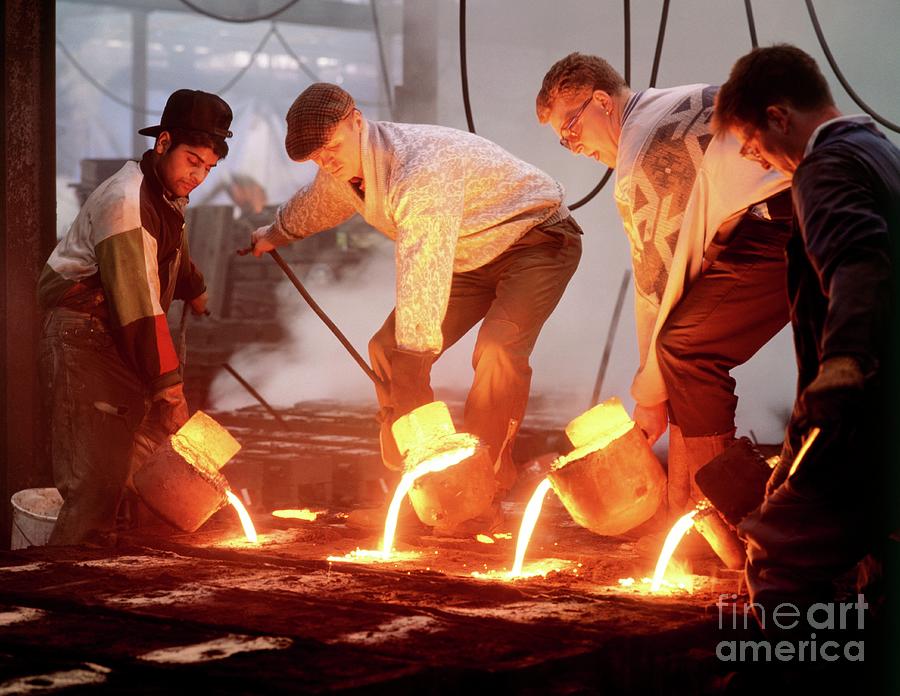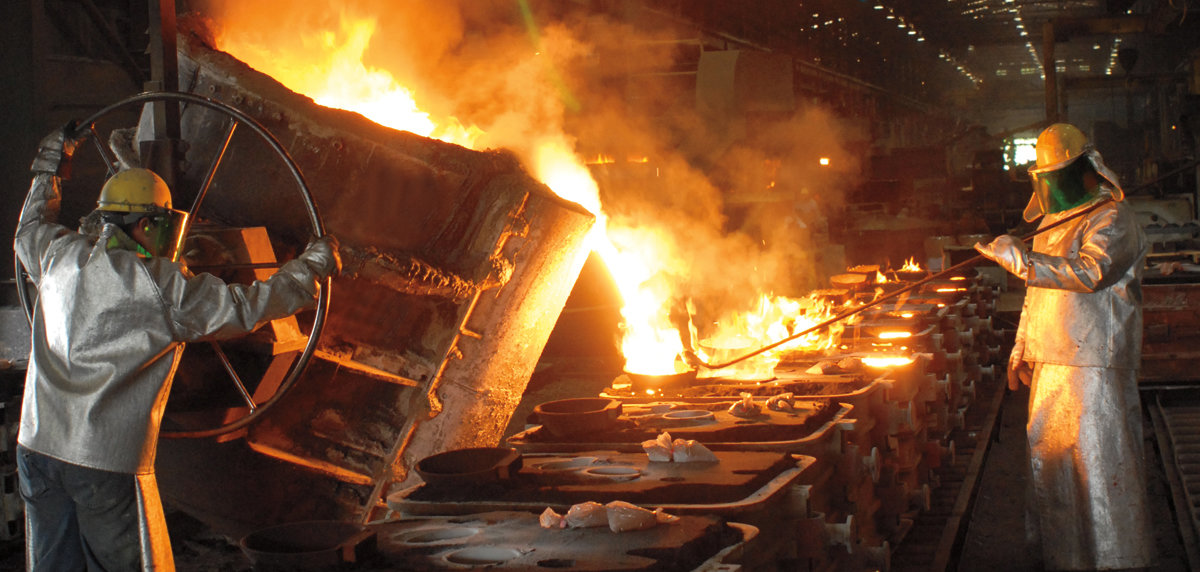How modern Metal Foundry innovations improve results in manufacturing
How a Metal Foundry Adds to Lasting Metal Production Practices
Metal foundries play a vital role in advertising sustainability within the metal production market. By integrating recycled products, they reduce reliance on virgin resources and minimize environmental influences. Energy-efficient melting processes even more reduce power intake and emissions. The trip toward sustainable practices involves even more than simply reusing and power monitoring. It encompasses a broader dedication to ethical sourcing and ingenious modern technologies. The effects of these techniques are considerable and warrant better assessment.
The Duty of Recycling in Metal Foundries
While metal production has actually typically counted on virgin materials, the boosting emphasis on sustainability has brought about a significant change in practices, particularly in metal foundries. Recycling has actually arised as a necessary element of this change, allowing foundries to repurpose scrap metal and lower reliance on mined sources. By integrating recycled products right into their procedures, foundries not just decrease ecological influence yet likewise reduced manufacturing costs.
Making use of recycled metals, such as aluminum, steel, and copper, decreases power intake and reduces greenhouse gas emissions linked with traditional mining and refining techniques. Additionally, foundries can accomplish premium outputs by employing advanced sorting and handling modern technologies to assure the pureness of recycled products. This focus on recycling fosters a round economic situation, where waste is minimized, and resources are made use of effectively. Consequently, metal foundries play a crucial function in advertising sustainable methods within the metal production market.
Energy-Efficient Melting Methods
Energy-efficient melting strategies are crucial for boosting sustainability in metal manufacturing. These strategies considerably minimize power consumption during the melting procedure, which is among the most energy-intensive stages in metal production. Technologies such as induction melting, resistance heating, and microwave melting deal enhanced performance compared to typical techniques. Induction melting, as an example, makes use of magnetic fields to generate warmth straight within the metal, lessening power loss and giving specific temperature level control.
In addition, implementing heat recovery systems can even more boost performance by capturing and recycling waste heat generated throughout melting. Utilizing advanced insulation materials and enhancing heating system layouts additionally contribute to power savings. By adopting these cutting-edge melting techniques, metal foundries can lower their carbon impact, minimize functional costs, and add to an extra lasting manufacturing landscape. The combination of energy-efficient methods not just lines up with ecological objectives however likewise meets the growing need for responsible manufacturing methods in the metal industry.
Sustainable Sourcing of Raw Materials
Sustainable sourcing of raw products is essential for decreasing the ecological impact of metal manufacturing. This includes the raised application of recycled metals, the fostering of moral mining practices, and efforts focused on regional sourcing. By prioritizing these approaches, the sector can advertise accountable resource management and assistance regional economies.

Recycled Metal Use
Just how can industries efficiently minimize their ecological effect while meeting the growing need for metal? One considerable strategy is the use of recycled metal. By integrating scrap metal right into their production processes, foundries can lower the extraction of virgin products, thus saving all-natural resources and lowering power usage. Recycled steels require much less energy to procedure compared to their raw counterparts, bring about reduced greenhouse gas emissions. Furthermore, using recycled metal aids divert waste from landfills, promoting a round economic situation. Industries that focus on recycled metal not only add to sustainability but additionally benefit from expense financial savings associated with lowered product procurement. Recycled metal utilization stands as an important strategy for environmentally accountable metal manufacturing.
Moral Mining Practices
While the need for steels remains to rise, industries are increasingly recognizing the significance of ethical mining practices in making certain responsible sourcing of basic materials. Honest mining encompasses a dedication to environmental stewardship, social obligation, and adherence to fair labor methods. Companies are currently focusing on collaborations with mines that demonstrate openness in their operations, decreasing environmental impact and respecting regional neighborhoods. This strategy not just cultivates a lasting supply chain yet also boosts the reputation of businesses entailed. By implementing extensive criteria and qualifications, sectors can combat illegal mining tasks and promote the welfare of employees. Inevitably, moral mining practices add markedly to a more lasting metal production environment, straightening economic growth with social and environmental honesty.
Local Sourcing Efforts

Technologies in Metal Casting Processes
Advancements in metal casting procedures are changing the sector by including advanced recycling strategies that decrease waste. Energy-efficient melting methods are likewise being established to decrease power intake throughout manufacturing. Furthermore, the usage of ingenious mold and mildew products contributes to improved efficiency and sustainability in casting procedures.
Advanced Recycling Techniques
Advanced recycling strategies are transforming metal casting processes, greatly boosting sustainability in the sector. These advancements concentrate on reprocessing and recovering scrap metal, substantially click for more reducing waste and the need for virgin products. Methods such as hydrometallurgy and pyrometallurgy allow foundries to extract useful metals from used components, making sure effective resource use. Additionally, progressed sorting and filtration technologies enhance the top quality of recycled metals, making them suitable for high-performance applications. This not only decreases the ecological impact of metal manufacturing yet likewise promotes a circular economy by promoting the reuse of materials. As these recycling approaches remain to progress, they assure to even more streamline operations within foundries and add to an extra sustainable metal production landscape.
Energy-Efficient Melting Methods
While standard melting approaches have actually long been the foundation of metal casting, recent improvements have actually presented energy-efficient techniques that noticeably reduce energy consumption and discharges. Technologies such as induction melting and electrical arc heaters have actually acquired importance, enabling exact control over temperature and minimizing the need for nonrenewable fuel sources. These approaches not just enhance energy effectiveness yet likewise promote quicker melting times, which translates to decrease operational expenses. Furthermore, advancements in warmth healing systems enable foundries to record and reuse excess heat produced during the melting procedure. look at this now This holistic technique to energy monitoring not only supports lasting methods however additionally placements metal foundries as leaders in the shift towards greener manufacturing processes, better lining up with international sustainability goals.
Cutting-edge Mold Products
As the need for more effective and lasting metal casting processes expands, the expedition of innovative mold and mildew products has actually ended up being a focal point in the sector. Traditional mold materials often add to environmental obstacles, motivating the look for choices that decrease waste and energy usage. Recent developments include the growth of recyclable composites and biodegradable binders, which not just enhance mold performance yet also minimize environmental effect. Additionally, using 3D printing technology in mold and mildew production permits detailed layouts that minimize material use and enable fast prototyping. These innovative products not just improve casting accuracy yet additionally straighten with sustainability goals, showcasing the industry's dedication to decreasing its carbon impact while preserving premium manufacturing criteria.
Reducing Waste Through Advanced Innovation
Cutting-edge modern technologies are transforming the metal manufacturing sector by significantly decreasing waste and enhancing effectiveness. Advanced data analytics and device learning algorithms allow foundries to maximize manufacturing procedures, determining ineffectiveness and reducing scrap product. Smart sensors check tools efficiency in real-time, enabling predictive upkeep that reduces downtime and waste generation. In addition, additive production techniques, such as 3D printing, permit the development of complex components with minimal product use, significantly reducing waste contrasted to standard approaches.
Closed-loop systems are becoming more prevalent, in which scrap metal and by-products are reused back right into the manufacturing cycle, ensuring that products are utilized to their max potential. This assimilation of technology not just promotes source conservation yet also boosts the overall sustainability of metal production practices. By embracing these advancements, foundries can add to a much more lasting future while maintaining competitiveness on the market
The Influence of Foundries on Carbon Footprint Reduction
Foundries play a necessary function in reducing the carbon footprint of the metal production sector by applying different sustainable practices. By using energy-efficient innovations, such as electric arc furnaces, these facilities considerably reduced greenhouse gas discharges contrasted to standard methods. Additionally, foundries increasingly embrace renewable resource sources, which also decreases their dependence on nonrenewable fuel sources.
Recycling scrap metal is an additional critical practice that foundries use, conserving sources and decreasing the need for virgin materials. This not just minimizes waste but additionally minimizes the energy-intensive removal procedures connected with mining. The fostering of closed-loop water systems helps to minimize water usage and lower wastewater discharge, adding to a much more sustainable procedure.
Through these initiatives, foundries show their commitment to environmental stewardship, resulting in a marked decrease in the total carbon impact of the metal production field. Their continuous efforts are critical in the shift towards an extra lasting commercial landscape.
Regularly Asked Questions
What Kinds of Metals Are A Lot Of Frequently Recycled in Foundries?
Light weight aluminum, brass, steel, and copper are among one of the most frequently recycled metals in foundries. see These steels are preferred due to their high recycling prices, financial value, and extensive availability, adding considerably to industrial sustainability efforts.
Just How Do Foundries Make Sure the Top Quality of Recycled Materials?
Foundries establish the quality of recycled materials through extensive screening, arranging, and filtration procedures. They carry out advanced innovations to analyze composition and eliminate contaminations, ensuring that the recycled steels satisfy market requirements for efficiency and safety and security.
What Qualifications Exist for Lasting Foundry Practices?
Numerous certifications exist for sustainable foundry practices, consisting of ISO 14001 for environmental management, ISO 50001 for power administration, and LEED accreditation for lasting structure practices (Aluminum Foundry). These qualifications assist assure adherence to ecological and sustainability requirements in procedures
How Do Foundries Gauge Their Carbon Footprint Decrease?
Foundries determine carbon footprint reduction via tools like lifecycle analyses, power audits, and discharges tracking systems. They contrast baseline discharges to present outcomes, examining enhancements in energy performance, product use, and renewable energy adoption over time.
What Are the Financial Benefits of Lasting Metal Manufacturing?
Lasting metal production offers financial benefits such as minimized operational expenses, raised effectiveness, boosted market competition, and potential federal government motivations. In addition, it cultivates innovation and attracts environmentally conscious consumers, ultimately driving lasting productivity for companies.
Metal foundries play a necessary role in advertising sustainability within the metal production industry. While metal production has actually generally depended on virgin products, the boosting focus on sustainability has actually led to a considerable shift in techniques, specifically in metal foundries. By integrating scrap metal right into their production processes, foundries can lower the extraction of virgin products, therefore conserving all-natural resources and decreasing energy intake. Foundries play a crucial role in minimizing the carbon footprint of the metal manufacturing sector by implementing various sustainable practices. Reusing scrap metal is an additional essential method that foundries utilize, saving sources and minimizing the demand for virgin materials.